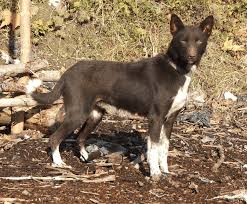
Zerdava
Conditions of detention
Zerdavas thrive in rural environments where they have plenty of space to roam and work. They are well-suited for homes with large yards or properties where they can engage in physical activities.
Useful Fact:
These dogs require regular exercise and mental stimulation to stay happy and healthy. They excel in homes with active owners who can provide them with tasks and opportunities to engage their natural instincts.
Nutrition and diet
A balanced diet rich in high-quality proteins and essential nutrients is crucial for the Zerdava to support its active lifestyle. High-quality commercial dog food or a diet incorporating lean meats, vegetables, and grains is recommended.
Useful Fact:
Feeding a diet that supports their energy levels and muscle mass helps maintain their health and vitality, especially given their active nature and working roles.
Health
Zerdavas are generally healthy dogs but can be prone to certain genetic conditions. Regular veterinary check-ups are essential to monitor their health and detect any potential issues early.
Useful Fact:
Maintaining a healthy weight and providing regular exercise can help prevent common health problems and keep them in top physical condition.
Grooming and care
The Zerdava has a medium-length, dense coat that requires regular grooming to prevent matting and to remove loose hair. Brushing once or twice a week will keep their coat healthy and reduce shedding.
Useful Fact:
Regular grooming helps maintain their coat’s natural oils and provides an opportunity to check for any skin issues or parasites.
Education and training
Zerdavas are intelligent and eager to please, making them relatively easy to train. They respond well to positive reinforcement and consistency.
Useful Fact:
Early socialization and obedience training are crucial to ensure they develop into well-mannered dogs that are comfortable around people and other animals. Their natural guarding instincts should be guided and managed to ensure they can work effectively.
Toys and entertainment
These dogs enjoy toys that challenge their minds and bodies, such as puzzle toys, fetch toys, and interactive games. Engaging in activities like agility training and scent work can be very stimulating for them.
Useful Fact:
Providing a variety of toys and regular playtime helps keep them mentally and physically active, preventing boredom and destructive behavior.
Safety
Due to their strong guarding instincts and high energy levels, Zerdavas should be kept in a secure area when outdoors. They need to be monitored to prevent them from wandering off or becoming overly protective.
Useful Fact:
A well-fenced yard is essential to give them the freedom to roam safely without the risk of escaping.
Accessories
Sturdy collars, harnesses, and leashes are important for managing the Zerdava during training and outdoor activities.
Useful Fact:
Using a harness can provide better control and prevent neck strain, especially during walks and training sessions.
Socialization
Zerdavas are friendly and form strong bonds with their families but can be wary of strangers. Early and consistent socialization is important to ensure they are comfortable in various environments.
Useful Fact:
Introducing them to different people, animals, and settings from a young age helps them become well-adjusted and confident adults.
Travel and Transportation
Zerdavas can travel well if they are accustomed to it from a young age. Ensuring they have a comfortable and secure space in the vehicle is important.
Useful Fact:
Using a travel crate or a harness designed for car travel ensures their safety and comfort during trips.
Behavior and psychology
The Zerdava is known for its loyalty, intelligence, and strong guarding instincts. They form strong bonds with their families and are naturally protective.
Useful Fact:
Understanding their guarding nature and providing proper training can help manage their behavior and ensure they are confident and well-behaved.
Legal aspects
Owners should comply with general dog ownership laws, such as licensing, vaccination requirements, and leash laws.
Useful Fact:
In some areas, there may be specific regulations regarding protective breeds, so checking local laws is important.


